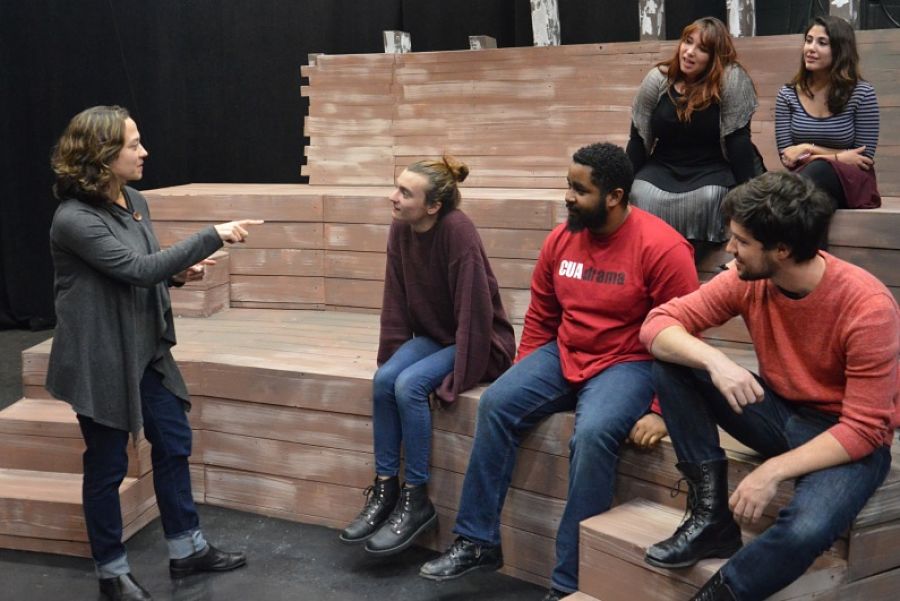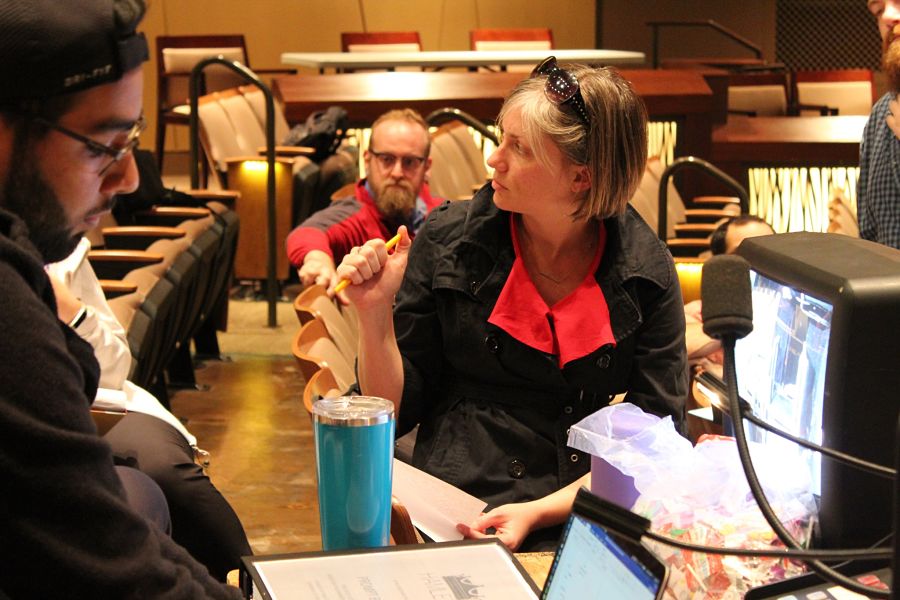For aspiring young performers, the path to success often starts immediately after graduating from high school. University programs all over the country are sought out for their Bachelor of Fine Arts and Bachelor of Arts programs, which provide young actors with rigorous training at the undergraduate level.
But for aspiring young directors, the road is often less clearly defined at this early stage. Students may major in Theatre Arts and have the chance to direct school productions, but few programs offer directing degrees at the undergraduate level. Several Masters of Fine Arts programs have emerged in recent years, however, that offer unique opportunities for budding directors. From internships all over the country to classes on everything from acting to theatre history, every MFA provides something different to a selective cohort. Balancing theory and practice, each program is built to foster the next generation of directors.
Virginia Tech in Blacksburg, Va., offers an MFA degree that teaches students more than just how to direct. The university’s program is a Master of Fine Arts in Directing and Public Dialogue for aspiring directors, with a particular focus on ensemble-based theatre. A three-year program, it places a strong emphasis on group work, creating original work, and building a creative community. Each student receives an advisor and creates their own individualized path of study; the public dialogue component includes artistic assignments sparked by acts of community engagement.
“Our program offers a three-year inquiry into each student’s core artistic values in the context of the many communities in which the student lives and works through a practical, project-based approach based on ensemble practices and theatre as a public forum essential for social health,” says primary advisor to the MFA program, Bob Leonard. Not only do students in the program work toward creating their own directorial path; they also develop skills in acting and performance through voice, movement, text analysis, and scene study courses. Students leave the program not only as emerging leaders in the artistic field, but also as engaged citizens ready to create theatre that directly reflects our current world.
Catholic University of America in Washington, D.C., takes an interdisciplinary approach to its MFA program, recognizing the versatility and knowledge it takes to become a well-rounded director. Students study not only voice, acting, and theory, but also take various design courses, and they’re even required to take a foreign language course in their second year, as these theatre artists prepare to work on both a national and an international level. MFA candidates are exposed to many different styles of theatre, including site-specific work, poetry as performance, and meta-theatre.

“With a strong sister MFA program in playwrighting, the directing students practice collaborating on the development of new work as well as studying realistic, classical, and devised works,” says program director Eleanor Holdridge. In the third year of the program, aspiring directors complete required internships at professional theatres in their area to ease their transition to the directing world after graduation. “As the only MFA in directing in a city with over 90 professional theatre companies of varying size and mission and scope, there are boundless opportunities to observe, assist, intern, critique, and learn from practicing theatre artists,” Holdridge says of the program.
Trinity Repertory Company at Brown University in Providence, R.I., accepts two directing students every three years into their MFA program. Each year of the master’s program focuses on a different directorial theme to provide directors with a well-rounded experience. Year one focuses on text analysis, dramatic action, and storytelling in Contemporary and Modern Dramas; year two places an emphasis on studying heightened language, and third-year students work with synthesis and expanded forms. Students participate in studio and theory classes, assistant-direct shows at Trinity Rep, and complete additional directing projects.
“While serving as co-artistic directors of their MFA company, the directors are guided toward developing their own voices, theatrical imaginations, and ways of seeing and hearing, asserting their personal visions as artistic leaders.,” says Brian Mertes, head of the MFA directing program. Brown/Trinity prepares directors to sustain a long career in performance-making nationally, internationally, and locally, and to frame the conversation with a spirit of investigation and provocation, generosity and inclusion, always with expert execution and a sense of play. Over the course of the program, candidates assist on two shows at Trinity Rep and direct a workshop production, a classical verse play, a contemporary play, a play of their choosing, and one fully mounted thesis production. Directing students also receive $10,000 in funding to support their creative endeavors after graduation.
California Institute of the Arts in Valencia, Calif., not only exposes its MFA directing students to different styles of theatre; it also teaches film directing and exploring new media to tell a story. Students with a particular interest in exploring digital media in directing have the option to concentrate on what’s call “integrated media.” Two students are accepted to the MFA directing program each year and receive several opportunities to direct productions at one of the Theatre School’s five theatres. While the three-year program is largely composed of directing courses, those enrolled in the MFA program are also exposed to courses in the BFA/MFA Acting Program as well as the BFA Design and Production program. Additional required courses include Cinematic Elixirs and Interpretive Strategies for Plays and Performance. Students also have the option to participate in an internship and/or to take classes at other CalArts schools. All candidates are required to complete a graduation review and to submit a thesis to receive their Masters.
Yale University in New Haven, Conn.’s MFA program in directing is designed not only to breed strong directors but to foster deep-thinking artists. Yale’s training puts an emphasis on director finding their personal vision, and works to support them as emerging leaders in the field. Each MFA student is enrolled in a Directing Practicum, various directing seminars, and lab courses. Directors have various opportunities to employ their skills: First-year students direct workshops in the New Play Lab, which features works by the first-year playwrighting students, while second-year directors work on a Shakespeare Repertory Project piece. In the third and final year, they direct a full production for their thesis project. Students assistant-direct on Yale Repertory or Yale School of Drama productions, for further learning beyond the classroom.
The University of South Dakota in Vermillion, S.D., offers an MFA in Theatre with a specialization in Directing, so the program has emphases on multiple aspects of theatre—text analysis, acting, design—in conjunction with directing. Students with this specialization are given many opportunities to direct, including helming their own mainstage production before they graduate. A professional internship is also required to complete the program. Students have access to various electives such as an auditioning course, a combat class, and the opportunity to be a part of an acting ensemble.
“USD’s MFA in Directing offers students the best of a large and small department,” says USD assistant theatre professor Joe Stollenwerk. “Students get to work closely with our 10 faculty members, each of us having a different approach to creating theatre and each with a different set of experiences. Our students greatly benefit from that diversity.” All directors are also required to take a stage management course as a part of the program.
Brooklyn College offers an MFA program in directing that can be completed in two years, unlike other programs, which require three years of study. Coursework for the program includes academic studies of history, theory, and literature, as well as opportunities to direct in the classroom and for on-campus productions. Each student also completes an internship with a New York-based theatre company, ranging from the Public Theater to Soho Rep, Vineyard Theater to Classic Stage Company or Playwrights Horizons. “The internships become gateways to the profession for our students,” says Thomas A. Bullard, head of the program at Brooklyn College. Electives are also offered in acting, dramaturgy, management, and design.
Texas State University in San Marcos has an MFA program in directing with unique specializations, including musical theatre, new-play development, and theatre history/dramaturgy, so MFA candidates can choose the work that specifically interests them. The program is open to two students a year, with each student getting the chance to direct five full-length productions, one-act plays, staged readings, short scenes, and class projects.

“Student class projects examine all styles and aspects of directing from working on classical theatre to devised theatre,” says program head Charles Ney. The curriculum includes conceptualization, composition, designer collaboration, and text analysis. Directing students can also study Shakespeare in England for credit. The program also has a partnership with the Oregon Shakespeare Festival and allows their students to intern at the festival or complete their intensive for credit.
Northwestern University in Chicago provides, in addition to a Ph.D. in Theatre and Drama, MFA programs in both Directing and Stage Design. The MFA Directing Program, which accepts three promising students per year, places a strong emphasis on storytelling and studying different literary and theatrical styles. The program is divided into four main categories of study: artistic collaboration, theatrical storytelling, theatre history and context, and civic engagement. In addition to directing courses, students also study stage design and theory. Candidates also participate in assistantships at various theatres in the Chicago area, working with outside directors to advance their skills. In the third and final year, candidates are eligible to receive a research grant in relation to their final thesis project. Both a written thesis and an oral defense are required for graduation.
Penn State in State College, Pa., offers a one-of-a-kind MFA Directing Program with a focus in musical theatre. This program is closely integrated with the college’s BFA musical theatre program so that candidates have the opportunity to train in acting, dance, and voice, as well as directing. Students direct at least five projects while in the MFA program, including a full-length thesis production. Also available is a graduate program in London. An internship is also required in the final semester with a professional director at a Broadway, Off-Broadway, or regional theatre.


